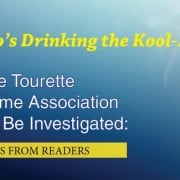A Message to Conventional Physicians on Tourette Syndrome
This editorial was written in 2000 and is being posted on our site for the first time.
Every week our organization hears from people affected by Tourette syndrome (TS) who, in spite of traditional treatment, are desperate for help. They usually inform us that when they asked their doctor if symptoms could possibly be related to diet, nutrition, or allergy, they received responses such as: “That’s hogwash.” “Get with reality.” “There is absolutely no connection.” “Don’t waste your time and money.”
It troubles me that any physician would resort to negative absolutes when significant questions remain unanswered about TS. The fact is, there are many reports of a link between TS symptoms and foods, nutrition, allergy, and chemical sensitivity. This being the case, the above “professional advice” is incorrect, misleading, and potentially harmful. Further, families have a right to determine for themselves what value they place on hopes for an improved quality of life.
When asked if environmental allergy treatment, nutritional supplements, dietary management, CranioSacral therapy, homeopathy, or manipulation can help with someone’s TS, I hope you will consider these responses:
- Tell the truth. Tell them you really don’t know.
- Advise them that there are anecdotal reports linking a variety of alternative treatments to improved TS symptomatology. You can confirm this by contacting Dr. Gerald Erenberg, Chairman of the Tourette Syndrome Association (TSA) Medical Advisory Board, or Sue Levi-Pearl, TSA Liaison for Scientific Studies.
- Explain that TS can be a complex condition, and what is helpful for one person may not be beneficial to another.
- Assure families that because current drug treatment for TS is not always satisfactory, you understand their need to pursue additional measures, either as a separate effort, or as a complementary method along with drug therapy.
- Let them know they can contact the Association for Comprehensive NeuroTherapy (ACN: www.Latitudes.org) for information on non-pharmacological approaches.
- Express interest in any positive or negative results they may have, and wish them well.









